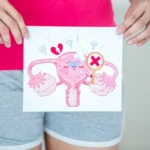According to the World Health Organization (WHO), polycystic ovary syndrome (PCOS) affects 8–13% of women of reproductive age. It has now become a common disorder in many females, affecting their hormones and standard of living. It has numerous side effects like excessive hair growth, acne, etc., and needs proper care.
This specially curated guide by Dr Rachna, a Gynaecology specialist in Rohini, will help females understand everything related to PCOS, some facts and healthy tips. If you are someone who has PCOS, this guide is for you!
What is PCOS?
Polycystic Ovary Syndrome (PCOS) is a hormonal condition that affects female reproductive parts (ovary) that makes eggs. Many doctors have detected cysts in female ovaries. However, not all females have cysts, which makes it difficult for them to determine whether they have PCOS or not.
Fact: 1 in 10 women have PCOS, and 70% of them are unaware of this condition.
Impact of PCOS on Hormones
This is how PCOS impacts the female hormones:
- Insulin resistance. Many women with this problem have insulin resistance, where their bodies can’t use insulin effectively. It causes the pancreas to produce more insulin to lower blood sugar levels.
- Increased androgen. Women often have higher levels of androgens, such as testosterone. They cause symptoms such as acne, excessive hair growth (hirsutism), and scalp hair thinning.
- Progesterone. Normal menstrual cycles involve a surge in progesterone after ovulation, which does not happen regularly in women with PCOS due to infrequent ovulation.
- Imbalance LS and FSH levels. In PCOS, the levels of LH are often higher relative to FSH. This imbalance can further enhance the production of androgens by the ovaries.
- High estrogen levels. Despite the ovulatory issues and dominance of androgens, estrogen levels can still be normal or even slightly higher in women with PCOS. It is due to the conversion of androgens into estrogens.
Factors triggering/causing PCOS
These factors often cause PCOS in females:
Lifestyle. An unhealthy lifestyle can also be a root cause of the development of PCOS. Lack of exercise can lead to an increase in weight, which further triggers metabolic imbalances like insulin resistance, which can also lead to diabetes.
Environment. Chemical pollutants like tobacco, lead, mercury, pesticides, and industrial pollutants can enter the body through inhalation or absorption by the skin and mucous membranes. These toxins can interfere with the hormone-sensitivity system and have significant and longer effects on reproductive health.
Insulin resistance. Insulin resistance (IR) is a major cause of polycystic ovary syndrome (PCOS). IR occurs when insulin does not work properly in various tissues. In PCOS, IR is caused by an inappropriate reaction to insulin in metabolically active tissues like adipose tissue and skeletal muscle.
Risks associated
These are the following risks associated:
- Reproductive issues: PCOS is a leading cause of infertility and can also cause pregnancy-induced hypertension, preeclampsia, gestational diabetes, miscarriage, and premature birth
- Cardiovascular issues: Women have a higher risk of heart disease, high blood pressure, and high LDL cholesterol
- Diabetes: More than half of women with PCOS develop type 2 diabetes by age 40
- Other health conditions: It can also be associated with acne, oily skin, excessive hair growth, weight gain, and obstructive sleep patterns.
How to identify PCOS – symptoms
This is how you can detect/identify this disease and take preventive measures:
- Irregular or no periods
- Excessive hair growth on the face & body
- Excessive acne
- Reduced fertility
- Hair loss
- Weight gain
- Excessive mood swings – stress, depression or anxiety
- Insomnia or difficulty in sleeping.
If you have any of these symptoms, we recommend you visit your nearest gynaecologist and consult with them.
How do doctors diagnose PCOS?
As mentioned, PCOS does not have any direct cause. However, some medical tests can determine if you are diagnosed with PCOS. You may also be diagnosed with PCOS if you have any of the two symptoms mentioned in the previous section.
Some of the tests performed are:
- Ultrasound. An ultrasound can determine the appearance of your ovaries and the thickness of your uterine lining. A wandlike device (transducer) is inserted into your vagina. The transducer generates sound waves, that convert into visuals on a computer screen.
- Pelvic exam. During a pelvic exam, your doctor will examine your reproductive organs for lumps, growths, or other abnormalities. They can also insert a glove to test the same.
- Blood tests. Hormone levels can be measured by blood testing. This testing can rule out potential causes of menstrual irregularities or androgen excesses that resemble PCOS. You may also undergo other blood tests, such as fasting cholesterol and triglyceride readings. A glucose tolerance test assesses your body’s reaction to sugar.
Treatment of PCOS
Here are some potential treatments and how to manage the PCOS in females:
- Medicines: Doctors prescribe some medications like birth control pills to help females get regular periods. They may include estrogen, progesterone, or both. They can regulate your menstrual cycle, treat acne and excess body hair, and reduce your risk of endometrial cancer.
- Lifestyle modifications:. Making significant changes in the lifestyle has proven to be beneficial in regulating periods. You must eat healthy food, increase your water intake, exercise regularly, and have a healthy sleep pattern.
- Fertility treatments: If you are having trouble conceiving, the other method option is getting an IVF treatment. You must consult the top gynaecologist to help them understand your situation and provide an option to conceive.
You may also perform yoga, acupuncture exercises, drink herbal tea, etc., to see significant changes in your menstrual cycle.
Period-related PCOS symptoms typically improve as menopause approaches. Your ovaries no longer function after menopause, thus your androgen levels decrease. And because you no longer get periods, irregular ones are not an issue.
However, your androgen levels may still be elevated, so you may continue to have symptoms. If you are facing discomfort consult with the gynaecologist to overcome the issue and live a healthy life.




